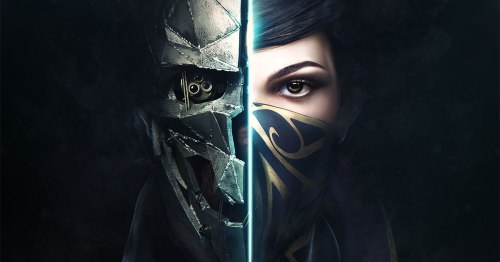One of the great challenges when designing video games is not merely to design a game that is interesting and fun for the first one or two hours of play, since this is helped along massively by the novelty of the game, the world, the story, etc. Novelty drives much of the excitement and curiosity. But what then when this extends into 10+ hours of play? What happens when the novelty wears off? That is where a game must truly prove its mettle.

I will be keeping this short, since truth be told I should be working on my thesis, but I use the excuse that this is relevant – which indeed it is to some extent. In many senses it still holds true that video games are about making interesting decisions, and the problem with today’s case, Dishonored 2 (2016) is that it does not continually offer players interesting decisions. Decisions yes, but I found my interest in these faltered steadily, as time passed throughout gameplay.
(Minor spoilers)
Dishonored 2 casts you in the role of either Corvo Attano, the protagonist of the first game, or his daughter the empress Emily Kaldwin. Emily is unrightfully dethroned by her aunt, Delilah, and the rest of the game is basically about finding the people that assisted the aunt and dealing with them before going for the head of the snake. This is of course a rough sketch of the plot, but you get the gist — the game actually does a very good job of setting up these initial parameters and motivations required to engage the player.
Our first real choice of the game is whether to play as Emily or Corvo, which I found rather exciting as it promised different play styles but also two different stories — based on the assumption that they have each their personality and will therefore also react differently to whatever scenarios we are later to face.
Something Dishonored 2 excels at is refraining from painting a black and white picture of the game world, which is also present in the games mechanics. There is no emphasis on one playstyle being better than another, in fact, the player is straight up told that there are many ways to skin a cat, and that we can chose to be as brutal or as stealthy as we see fit. However, we are also told that our actions will have an impact on the world, and that is always an exciting prospect because it makes decisions meaningful from a narrative perspective — the story and world will change according to what we do. Alas, I found that this did not hold entirely true in all aspects, and on the contrary many decisions felt flat and in many ways inconsequential. Let me in brief explain why.

As mentioned, the world is not simply black and white, however one does tend to find it predominantly worn down, grimy, and lacking of characters to inspire hope and sympathy. But wait, we’re the protagonist of the game, we can inspire hope! Right? Well, maybe… After being overthrown and upon taking control of Emily in her room in which she in locked in, there is not a lot of sympathy to detect in her voice. She expresses resentment towards the guards and all the people that helped her aunt in the coup. In such a mental state, I found no major reason to be all sneaky and merciful. Moreover, later in the game we are given access to a heart that reveals peoples thoughts and most of these were rather nasty, which once again does not inspire much mercy. Now, the game is clever in the way that it acknowledges your actions, and has some of the NPCs play of whether you decided to kill someone, or simply hide them away for a bit, which again felt good a few times, until the novelty of it wore off.
The issue is that the decisions made need to connect, through the game, with the player on some emotional level. Without the emotional impact, actions also partly lose their meaning, and I as a player will be more prone to lose incentive to play and engage with the game world.

The problem in Dishonored 2, as I saw it, was that ones actions just didn’t have enough of an impact. Yes, more blood flies (nasty big bugs) would be in certain areas, but that just seemed a nuisance more than anything else. Emily should become more cynical if you play her with murderous tendencies, however, this cynicism never hit alarming levels where I though, “Damn, I might wanna lay off with the killing, because she is heading straight off the rails here!”.
Part of this I believe came down to the game structure. Everything is set up in missions. You complete mission 1 in one area, and then move on to mission 2 in the next. Never at any point do you return to any one place that you visited earlier (with the exception of the throne room where the game begins and ends). This in turn means there is no comparable and observable change over time. If I ruined an area through reckless acts I am none the wiser, because I never got to see the result. And yes, you do get a short piece of monologue at the end where you are told what happens in various regions, but it is too little too late. I am done, and a few illustrations does not change the lack of impact throughout play. Moreover, the impact narrated at the ending is not tangible in any way – I never got to experience it.
Dishonored 2 invites a great variation of play, and an exploratory approach to the world through the tools at your disposal — and you are missing out if you don’t play around and mix stealthy approaches with more forceful ones — the game is all about meaningful and fulfilling choices in gameplay, where you, for instance, feel that you just got through a tough area via clever decisions. This feels good, because the game will punish you if your plan fails (the guards hurt). Sadly, these meaningful ludic choices aren’t properly integrated into the narrative space of the world, which is why it falls flat in some ways. So whereas there may not be a direct ludo-narrative dissonance in the game, it is an example of how a good game could have been an amazing game, if but game elements and narrative elements had been woven slightly closer together to create combined meaningful choices with emotional impacts on several levels. The game therefore relies heavily on the gameplay mechanics to stay interesting at length, and when abilities begin to swing heavily in the players favour and difficulty at later levels therefore decreases, even this element of choice making is slightly lost.
In conclusion, I therefore argue that in a game such as Dishonored 2, developers must be very careful when constructing the game world as to ensure that it stays interesting and meaningful, not just gameplay wise, but also in terms of narrative and emotional investment, if it is to be played for an extensive amount of time — at least if you play to experience the game and its story and not as a gameplay challenge.
